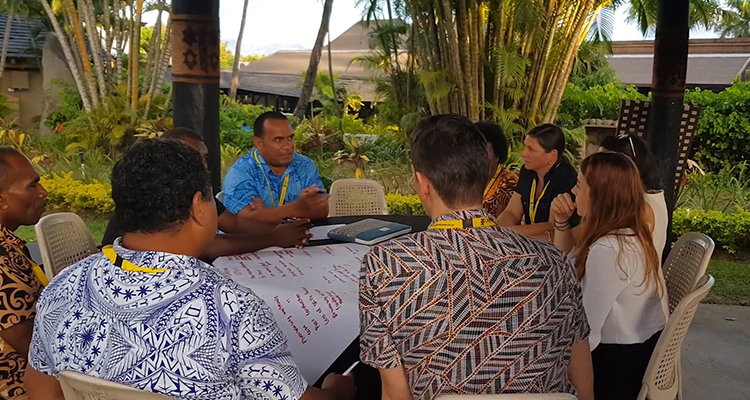
UNSW's Institute for Global Development supported a summit in Fiji on sustainable infrastructure and poverty reduction through better housing in Pacific Island nations.
Seed funding and in-kind support from the Institute for Global Development (IGD) enabled UNSW to join forces with the Asian Development Bank Institute (ADBI) to hold a symposium in Fiji for Pacific Island community members on Capacity Building in Green Infrastructure and Housing for Poverty Reduction.
Since 2016, the IGD has been coordinating and channelling the work of the UNSW community, including staff, students and alumni, to contribute to achieving the UN Sustainable Development Goals. The aim is to develop local capacity in communities of greatest need through teaching, research and collaboration, both in Australia and overseas.
Last year, the IGD provided seed funding to nine projects across the University, including the first phase of a project led by Dr Sarath Mataraarachchi, Senior Lecturer in the Faculty of Built Environment. The project brought together government and NGO representatives, academics, students and community members from all over the Pacific region to collaborate and learn from each other to build capacity in developing sustainable infrastructure and housing maintenance to improve quality of life. The IGD also provided project management support and development programming advice.
As IGD project lead and symposium co-chair, Dr Mataraarachchi worked with Senior Economist Dr Wawan Juswanto from the ADBI to identify and invite participants across the region, as well as representatives from NGOs. IGD and ADBI then partnered with the World Bank, the University of the South Pacific, the University of Fiji and Plan International to hold the symposium in Nadi, Fiji, from 25 to 27 June. Academics and industry practitioners from Australia also travelled to Fiji to present at the symposium.
“There were a couple of reasons why we wanted to bring every Pacific country to the symposium,” Dr Mataraarachchi said. “One is for the representatives to understand each other’s challenges in achieving sustainable infrastructure, adequate housing and poverty reduction. Secondly, we need to work as a group, because these countries are small, and the scale isn’t there.”
As well as presentations about frameworks, assessment tools and accreditation, the formal program included practical workshops where participants identified their country’s most pressing infrastructure needs and their major obstacles. They then used the outcomes to build business cases, applications for funding and submissions. The focus was on improving community well-being using modern know-how and technology while not forgetting traditional knowledge and ways of living.
Site visits to a village, town and informal settlement in Nadi following the Housing for Health presentation enabled symposium members to see first-hand how the proven model links household health to basic infrastructure.
Four UNSW students were selected from the Master’s program in Sustainable Built Environment to travel to Fiji and participate in the symposium, facilitating and acting as record keepers in the workshops.
Elizabeth Londoño from Medellín in Colombia, Jessica Baldwin from Sydney, Deeksha Nathani from Mumbai and Maria Teresa Verde Pujol from Madrid saw theory come to life as they listened to the participants explain their infrastructure issues, and they had the chance to share their own experiences.
“I strongly believe we achieved the objective we set out to achieve,” said Dr Mataraarachchi. “We wanted to show how planning can play a critical role in infrastructure development. And, as some of the public servants and community members said, for the first time, they understood how many aspects and elements are involved in infrastructure planning, and particularly in sustainable infrastructure planning. It’s an iterative process not a linear one, and it’s multidimensional because infrastructure is linked to everything we do.”
- Log in to post comments
